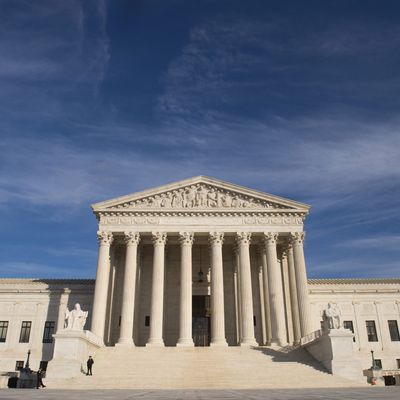
The U.S. Supreme Court will hear two partisan gerrymandering cases in March, the Washington Post reported on Friday. Justices will review two lower court rulings centered on one Maryland congressional district drawn by Democrats, and North Carolina’s entire congressional map, drawn by Republicans. In both cases, plaintiffs claim that the maps have been drawn not to reflect the actual makeup of the population, but to create safe congressional seats for one of the two major parties. In North Carolina, for example, gerrymandering likely prevented Democratic candidates from making much headway against the Republican members of the state’s delegation — though in the state’s Ninth District, electoral fraud also influenced that trend. The cases have the potential to be historic. “The Supreme Court has never found a state’s redistricting map so infected with politics that it violates the Constitution,” the Post pointed out; in June, the court declined to consider both the Maryland map and another case challenging the constitutionality of Wisconsin’s gerrymandered state assembly map.
As the Post noted, the Maryland and North Carolina maps both have a troubled history. In Maryland, Democrats have waged a legal battle to keep the state’s Sixth District as it is, though there’s plenty of evidence that it is indeed a partisan gerrymander. State Republicans, including Governor Larry Hogan, have called for an independent commission to redraw the map.
North Carolina’s map is also clearly partisan; it was drawn by Republicans and favors Republican candidates. But since 2011, its various incarnations have also been marked by accusations of racial animus. In 2017, the Supreme Court upheld a lower court ruling that two North Carolina congressional districts, drawn in 2011, amounted to racial gerrymandering — an unconstitutional attempt to dilute the state’s black vote. Republican legislators then redrew the map, claiming at the time that they were motivated by partisan politics, rather than racial animus. In June, the high court approved some, but not all of the state’s redrawn districts. North Carolina Democrats, in conjunction with progressive grassroots organization Common Cause, have also filed suit over the redrawn maps. And as Slate reported on Thursday, state Republicans tried, and failed, to get the case taken out of state court, where it would eventually reach a left-leaning state supreme court, and placed into the federal circuit.
However the Supreme Court rules in either case, justices will likely to reshape the political fortunes of both parties. But the consequences will be most pronounced for Republicans, who have more districts at stake. The court’s makeup has obviously changed since it declined to consider gerrymandering cases in June; Brett Kavanaugh is now a justice, which tilts the court even more dramatically to the right. That shift, combined with the court’s own record on voting rights, make the court’s possible rulings difficult to predict. Chief Justice John Roberts’s 2013 majority opinion in Shelby County v. Holder encourages concern. In that case, the court ruled that nine states with a history of legal racial discrimination no longer had to seek federal approval before changing their election laws. “Our country has changed,” Roberts wrote, as quoted by the New York Times. “While any racial discrimination in voting is too much, Congress must ensure that the legislation it passes to remedy that problem speaks to current conditions.”
Some time this year, we may find out exactly how much the court thinks America has changed.






























